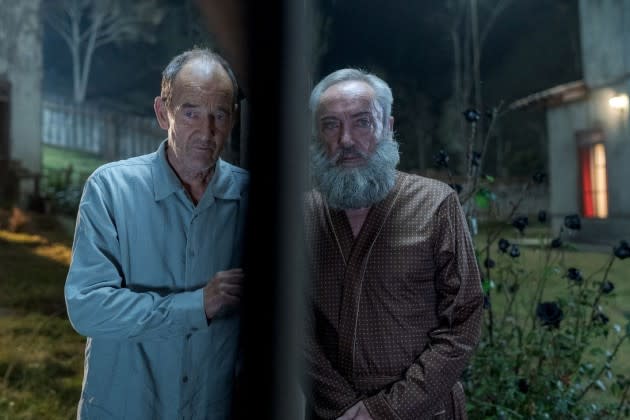Israeli Filmmakers Ask Locarno to Pull Movie Due to Concerns Over “Racist and Explicitly Political” Conditions Attached to Film’s Financing (Exclusive)

A group of Israeli filmmakers and artists are urging the Locarno Film Festival to drop the world premiere screening of Israeli feature My Neighbor Adolf due to concerns over what the group is calling “racist” and “explicitly political” conditions attached to its funding, The Hollywood Reporter has learned.
The tragicomedy, from Russian-born Israeli director Leon Prudovsky (Five Hours From Paris), is currently set to get a screening in Locarno’s Piazza Grande on Thursday, Aug. 4, the second day of the festival, but the group — which includes Oscar-nominated director Guy Davidi (Five Broken Cameras, upcoming Venice-bowing doc Innocence) — has signed a letter calling on this event to be pulled because of the film’s support by the Rabinovich Foundation’s Israel Cinema Project, Israel’s largest film fund.
More from The Hollywood Reporter
Toronto Film Festival: Emily Bronte Movie 'Emily' to Open Platform Competition
Strand Releasing Takes '99 Moons' for North America (Exclusive)
The move comes a day after PACBI, the cultural arm of the Boycott, Divestment and Sanctions movement, a Palestinian-led effort that claims to be inspired by the boycott tactics that helped overthrow Apartheid in South Africa, called for “all film institutions, including international festivals, cinemas and distributors, to boycott films funded from 2022 onwards by the Yehoshua Rabinovich Foundation for the Arts’ Israel Cinema Project.”
PACBI asserts that the Rabinovich Foundation is now contractually obligating producers to agree that their films don’t include any statement or message that denies the “existence of the State of Israel as a Jewish and democratic state,” something it says goes against the reporting of human rights organizations including Amnesty International, Human Rights Watch and B’Tselem, who have all described Israel as deploying an “Apartheid” system against Palestinians.
PACBI also claims that films applying to the Foundation’s fund mustn’t mark Israeli Independence Day or the day of the establishment of the state (a day also known as the “Nakba,” meaning “catastrophe” in Arabic) as a “day of mourning,” describing the funding conditions as “shielding Israel from international scrutiny and accountability” and forcing filmmakers to “deny the reality.”
In the letter, seen by THR, the group of Israeli filmmakers and artists — which alongside Davidi includes Dror Dayan (documentary filmmaker), Avi Hershkovitz (filmmaker), Liad Hussein Kantorowicz (artist, musician), Jonathan Ofir (conductor, violinist), Michal Sapir (musician, writer) and Eyal Sivan (filmmaker) — said the Foundation had attached “racist and explicitly political strings” to its funding.
“Israel is an apartheid state, as Palestinians, South Africans and legal scholars have long argued, and as Amnesty International and Human Rights Watch have in the last few years confirmed in detailed reports. Far from being a democracy, Israel is ‘a regime of Jewish supremacy from the Jordan River to the Mediterranean Sea,’ as the leading Israeli human rights group B’Tselem puts it,” the group wrote.
“This regime of oppression was founded through the violent displacement and dispossession of most of the Indigenous Palestinian population. That the Israeli state, its complicit institutions and influential lobby groups would want us as Jewish Israelis to remain silent on this systematic ethnic cleansing is not surprising. But storytellers accepting such censorial and unethical conditions for their film projects is an undeniable form of complicity in covering up this ongoing Nakba that Palestinians face.“
When approached by THR, the Rabinovich Foundation asserted that the excerpts of its contract cited by PACBI weren’t new, and had been added not by the Foundation itself but by Israeli law legislated in 2011.
“This Israeli law obliges all institutions funded by the State of Israel (film funds, theaters, dance groups etc.),” it stated. “Like all Israeli film funds, the Rabinovich Foundation is funded by the Israel Ministry of Culture and Sport, and like all Israeli film funds, the foundation is obliged by this law.”
At the center of the dispute, My Neighbor Adolf stars David Hayman (The Boy in the Striped Pajamas, Sid and Nancy) as a Holocaust survivor living in Colombia in 1960, in the period just after Nazi criminal Adolf Eichmann was caught by Mossad agents in Argentina. When a mysterious old German man (Udo Kier) moves in next door, he begins to suspect his new neighbor is Adolf Hitler. But to find the evidence, he will first have to get closer to the man, so close there’s a danger the two could become friends. Earlier this year, the Cohen Media Group acquired U.S. rights to the film.
In a statement provided to THR, Locarno artistic director Giona A. Nazzaro agreed that films should be produced without any conditions, but said that My Neighbour Adolf would still screen at the festival as planned on the Piazza Grande on Aug. 4.
“When we selected Leon Prudovsky’s My Neighbor Adolf in April we chose a film that convinced us with his tremendous artistic qualities. A depiction of the complex human experience, expressed by the touching performances of David Hayman and Udo Kier,” he wrote.
“Freedom of expression and the artistic freedom have been the guiding principles of the Locarno Film Festival for 75 years. We are convinced that all artistic works need independence and dialogue and should be produced always without constraints. Director Leon Prudovsky confirmed that he was not suffering from any pressure when making his film.”
Update Aug 3: Statement from Locarno added
Best of The Hollywood Reporter

 Yahoo News
Yahoo News 